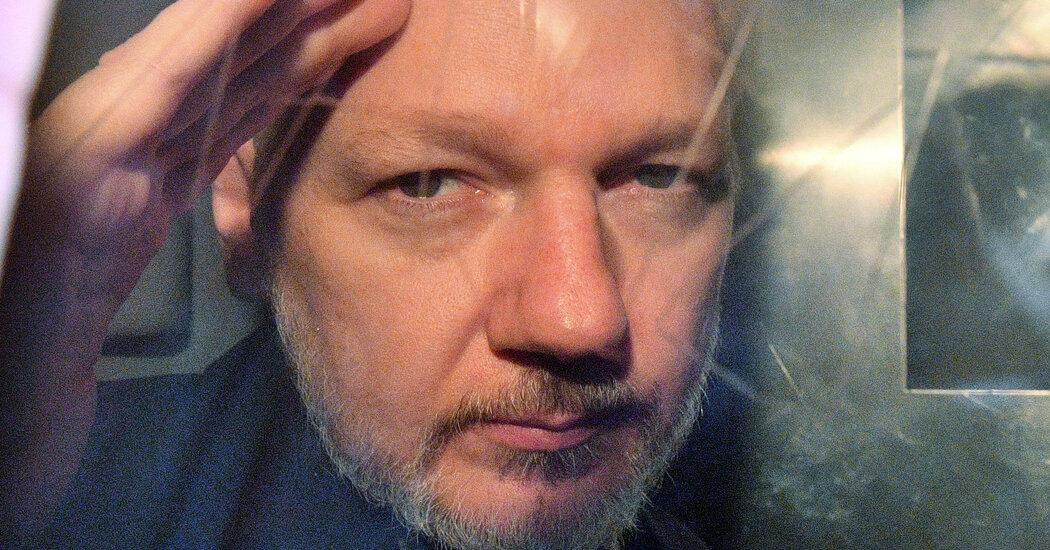Five years after WikiLeaks founder Julian Assange was first jailed in a maximum-security facility in Britain while fighting a U.S. extradition request, the Biden administration has given its clearest signal to date who could abandon the legal proceedings against him.
But Mr Assange's wife said on Thursday that her hopes were tempered by the reality that his extradition case had reached a critical juncture.
“It's been five years, and now he's closer than ever to extradition,” his wife, Stella Assange, said in an interview, adding: “Obviously with a comment like this from the president, it's a good sign and we receive with hope. But as we know, this does not prevent us from fearing the worst.”
President Biden, when asked by a reporter on Wednesday about a request from Australia, Mr. Assange's home country, to be allowed to return there, responded: “We are considering it.” Those three words suggest that the United States may no longer prosecute Assange on charges under the Espionage Act that WikiLeaks published tens of thousands of secret military and diplomatic documents more than a decade ago.
Mrs Assange said the timing of the president's statement was remarkable, just days before British court hearings on her husband's extradition were due. When a British high court ruled last month that Mr. Assange could not be extradited immediately until the United States met certain conditions, the judges gave U.S. prosecutors until April 16 to offer assurances about his potential treatment .
If Washington provides guarantees, including First Amendment rights and protection from the death penalty, a further hearing is scheduled for May 20 in London to decide Assange's fate.
On Thursday, Mrs Assange urged the Biden administration to drop the charges against her husband, saying it was the “right thing to do”.
The charges against Assange could amount to a sentence of up to 175 years in prison, although U.S. attorneys said he was more likely to be sentenced to four to six years.
Rebecca Vincent, international campaign director for Reporters Without Borders, which has pushed for Mr. Assange's release and which advocates for press freedom, noted in a statement that he had already spent five years in prison in Britain, despite not having been convicted for anything. crime.
“No matter what you think of Assange, five years is more than enough,” he said. “No one should suffer such treatment for publishing information in the public interest – and First Amendment country could and should do better.”
The indictment against Assange, 52, was filed under the administration of Biden's predecessor, Donald J. Trump, in 2019, nine years after WikiLeaks published tens of thousands of secret military and diplomatic documents that included revelations about the deaths of civilians in the country. wars in Iraq and Afghanistan.
The documents were leaked by Chelsea Manning, an Army intelligence officer sentenced to 35 years in prison but released after seven years when President Barack Obama commuted her sentence.
In 2012, Mr. Assange fled to the Ecuadorian embassy in London to escape extradition to Sweden, where he faced an investigation into unrelated sexual misconduct and rape charges that were later dropped. He remained there for seven years before Ecuador stopped protecting him, allowing him to be promptly arrested for skipping bail.
Weeks later, in May 2019, US prosecutors accused him of violating the Espionage Act by soliciting and publishing classified government information, charges that raise First Amendment issues. Since then he has been held in Belmarsh Prison in London.
Australian Prime Minister Anthony Albanese has already discussed the case with President Biden, and in February, Australian lawmakers backed calls for Assange's release. Hours after Biden's comments this week, Albanese described them as “encouraging.”
“I believe this must be brought to a conclusion and Mr Assange has already paid a significant price, and enough is enough,” the Australian leader said in a statement to Sky News. “There is nothing to be gained from the continued incarnation of Mr. Assange.”
Amid speculation that the Justice Department might also consider a plea deal in Mr. Assange's case, as the Wall Street Journal reported last month, Barry Pollack, a lawyer for Mr. Assange, said in a statement that it would be inappropriate for the legal right. team to comment. But he said Mr Assange's lawyers had “been given no indication that the Justice Department intends to resolve the case and the United States is continuing as vigorously as ever to seek his extradition on all 18 charges.” .
Mrs Assange argued that prosecuting her husband would be “a problem for the press”, regardless of which administration holds power after the US election in November, adding that “the problems must be obvious for Mr Biden who will become his legacy unless the administration does not have to think long and hard to reconsider it.
“The case and the indictment, obviously, should have been dismissed from day one,” he said. “So it's the right thing to do, and it's long overdue.”
Ms. Vincent of Reporters Without Borders also remained cautiously optimistic. She said her organization hopes the Biden administration is “considering a resolution to the case that involves the immediate release of Julian Assange with no further prison time, and an end to these interminable extradition proceedings.”





